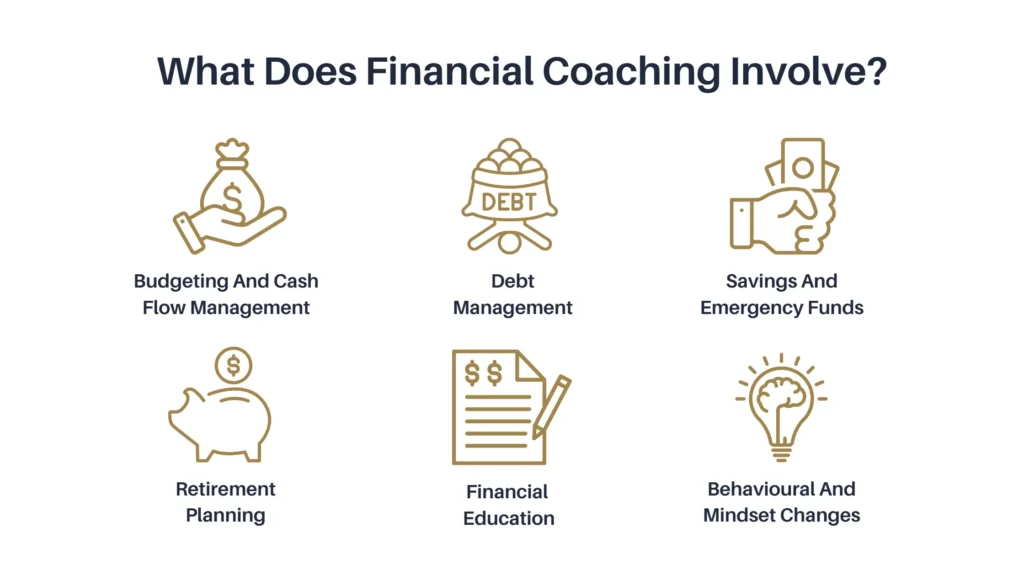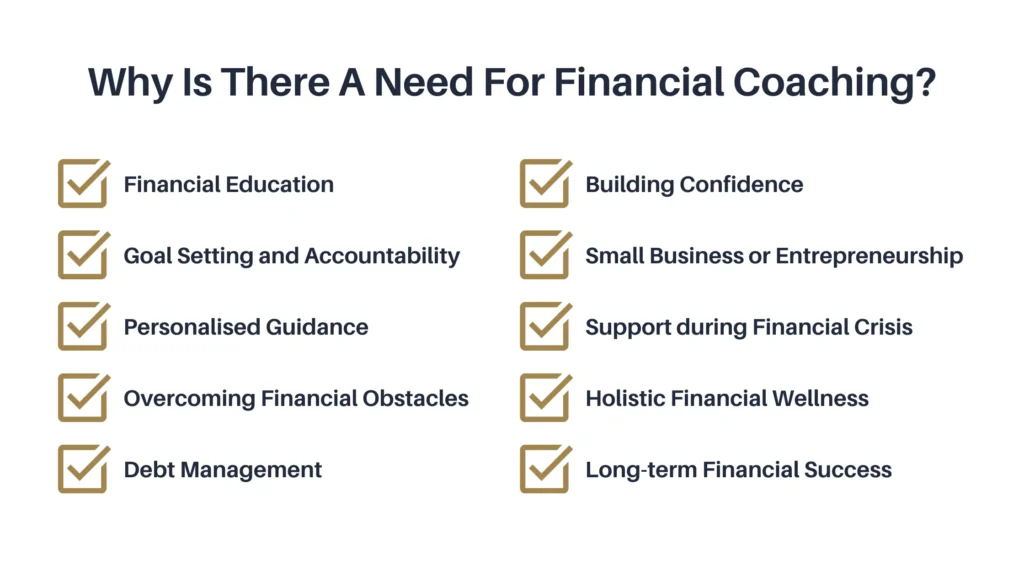
Meet Penniless Pulsar, a hardworking employee at a small company.
When he receives his monthly paycheck, he immediately rushes to indulge in trendy clothes, expensive restaurants, and lavish outings with friends.
But, living paycheck to paycheck becomes a struggle, burdened by credit card debt and high-interest payments. Bills pile up, and managing finances becomes overwhelming for him.
Unexpectedly, his car breaks down, and without sufficient savings, he has to rely on his credit card, adding to his mounting debt. Trapped in a cycle of financial instability, Penniless Pulsar can’t break free from his reckless spending habits.
As months pass, his financial situation worsens. Anxiety creeps in, affecting his focus at work and performance. Mounting debt and constant worry about the future consume his thoughts, making it difficult to fulfil his responsibilities.
Do you find yourself in a similar situation?
If yes, it’s time to stop worrying because financial coaching can save the day. In our blog, “The Ultimate Guide to Financial Coaching,” we’ll explore how professional guidance can help you regain control of your finances and transform your life.
Let’s dive in!
What Is Financial Coaching?

Financial coaching is a personalised and supportive approach to helping individuals gain control over their finances and improve their financial well-being. It involves working with a trained professional, known as a financial coach, who provides guidance, education, and accountability to help clients achieve their financial goals.
Financial coaching goes beyond traditional financial advice by focusing on the individual’s mindset, behaviours, and emotions surrounding money. One of the key aspects of financial coaching is empowering clients to make informed financial decisions and develop healthy financial habits.
Whether someone is struggling with debt, facing financial challenges, or simply seeking to optimise their financial situation, financial coaching can provide valuable guidance and support to help them make positive and sustainable changes in their financial lives.
What Roles Does A Financial Coach Play For The Client?
Here are some key roles a financial coach typically takes on:
- Educator: Provides knowledge and information about financial topics, teaching clients about budgeting, saving, investing, and debt management.
- Goal Setter: Assists clients in defining their financial goals and aspirations, helping them establish realistic objectives.
- Planner: Helps clients create personalised financial plans, analysing their income, expenses, assets, and liabilities to develop actionable steps.
- Accountability Partner: Holds clients accountable for their financial actions, providing ongoing support and guidance to stay on track.
- Behaviour Modifier: Helps clients modify harmful financial behaviours and develop healthier money management habits.
- Motivator: Provides motivation and encouragement, helping clients focus on their financial goals.
- Resource Provider: Recommends relevant financial resources, tools, and professionals to support clients’ financial journey.
What Does Financial Coaching Involve?

Here are some key areas that financial coaching often covers:
- Budgeting and cash flow management: Financial coaches help clients create and maintain a budget that aligns with their income and expenses. They assist in tracking spending, identifying areas for potential savings, and establishing a system for managing cash flow effectively.
- Debt management: 55% of individuals who had unsecured debt had successfully reduced the total sum they owed after participating in a financial coaching program. Coaches help clients understand their debt obligations and develop strategies to pay off debts efficiently. This involves creating debt repayment plans, negotiating with creditors, or exploring debt consolidation options.
- Savings and emergency funds: According to a Citigroup study, 54% of participants in a financial coaching program were able to accumulate savings despite having none initially. Financial coaches help clients identify ways to increase savings, establish emergency funds, and explore investment options.
- Retirement planning: Financial coaches help clients prepare for retirement by estimating retirement needs, considering living expenses, healthcare costs, and other factors. The percentage of the Australian workforce who expects a comfortable retirement has fallen to 10%, making financial coaching absolutely essential. Coaches guide clients in developing saving and investment strategies to accumulate the necessary funds for retirement.
- Financial education: Financial coaches provide education on various financial topics, such as basic financial literacy, understanding credit scores, investment basics, and retirement planning. They aim to empower clients with the knowledge to make informed financial decisions.
- Behavioural and mindset changes: Financial coaches address personal finance’s behavioural and mindset aspects. They help clients identify and overcome financial obstacles, develop healthy financial habits, and manage impulsive spending or emotional reactions to financial stress.
What Are The Consequences Of Ignoring Financial Coaching?
Ignoring financial coaching can lead to several negative consequences:
- Poor financial habits: Without proper guidance, individuals may develop poor financial habits such as overspending, impulse buying, accumulating debt, and failing to save money.
- Increased debt: Without guidance on managing debt, individuals may accumulate excessive debt from credit cards, loans, or other financial obligations. High-interest rates and late payment fees can worsen the situation, leading to a debt spiral that becomes difficult to escape.
- Inadequate savings and retirement planning: Ignoring the guidance of financial coaching can result in insufficient savings, leaving individuals vulnerable to unexpected expenses and a lack of financial security in their later years.
- Missed investment opportunities: Ignoring financial coaching may result in missed opportunities for wealth creation and long-term financial stability.
- Limited financial knowledge: Ignoring financial coaching means missing out on valuable knowledge of important financial concepts such as budgeting, investing, and managing credit that can empower individuals to make informed financial decisions.
- Emotional and mental stress: Financial difficulties can lead to significant stress, anxiety, and strain on personal relationships. 21.9% of the Australian workforce suffers from severe to moderate financial stress. Ignoring financial coaching may prolong or exacerbate these challenges, affecting overall well-being and quality of life.
- Lack of long-term financial goals: Financial coaching helps individuals set realistic and achievable financial goals, such as buying a home, starting a business, or funding education. Ignoring this guidance may result in a lack of direction and purpose in financial decision-making.
Why Is There A Need For Financial Coaching?

Financial coaching is a valuable resource for individuals and families for several reasons:
- Financial Education: Financial coaching provides education and guidance on budgeting, saving, investing, debt management, and retirement planning. It helps individuals build a strong foundation of financial literacy, enabling them to make informed decisions about their money.
- Goal Setting and Accountability: Financial coaching helps individuals set realistic financial goals and create a plan to achieve them. A coach assists in identifying short-term and long-term objectives, whether it’s paying off debt, saving for a down payment, starting a business, or planning for retirement.
- Personalised Guidance: Everyone’s financial situation is unique. Financial coaches work with clients one-on-one to understand their circumstances, goals, and challenges. They provide personalised advice and strategies tailored to the individual’s needs, ensuring the recommendations are relevant and practical.
- Overcoming Financial Obstacles: Life events such as job loss, divorce, medical emergencies, or significant purchases can significantly impact personal finances. Financial coaches assist individuals in navigating these challenges and developing strategies to overcome them. They guide managing sudden changes, creating emergency funds, or adjusting financial plans accordingly.
- Debt Management: Many individuals struggle with debt, whether credit card debt, student loans, or other forms of borrowing. Financial coaches help clients develop strategies to manage and reduce debt effectively. They can assist in creating debt repayment plans, negotiating with creditors, and exploring options for consolidation or refinancing.
- Building Confidence: Financial matters can be overwhelming and stressful for many people. Financial coaching helps build confidence by empowering individuals to take control of their financial lives.
- Small Business or Entrepreneurship: Financial coaching is invaluable for individuals starting a business or pursuing entrepreneurship. Coaches assist with financial forecasting, creating a business plan, managing cash flow, and understanding the financial aspects of running a business.
- Support during Financial Crisis: During economic downturn, market volatility, or personal financial crisis, individuals experience heightened anxiety and uncertainty. Financial coaches provide emotional support and practical guidance to help clients navigate these challenging situations. They can assist in assessing financial options, managing financial stress, and developing strategies to regain stability.
- Holistic Financial Wellness: Coaches address the relationship between money and factors like mental health, relationships, career satisfaction, and overall life satisfaction. They help individuals achieve a sense of balance and alignment between their financial and broader life goals.
- Long-term Financial Success: Financial coaching focuses on building strong financial habits and behaviours that can lead to long-term success. By developing healthy financial practices, individuals are better equipped to handle financial challenges, save for the future, and achieve their goals.
It is not surprising that 1 in 2 employees is likely to seek professional financial support in Australia. The image below shows the top reasons employees seek financial support.

Financial coaching provides comprehensive support and guidance to address all the above financial challenges and goals. Whether you’re struggling to manage your expenses, seeking to optimise your savings and investments, or aiming to develop solid financial skills for the future, financial coaching offers a transformative experience.
How To Select The Best Financial Coach?
Selecting the best financial coach is an important decision, as they will play a significant role in guiding your financial decisions and helping you achieve your goals. Here are some steps to consider when selecting a financial coach:
- Define your goals: Clarify your financial objectives and areas where you need assistance.
- Research credentials: Look for coaches with relevant certifications and qualifications.
- Seek recommendations: Ask for referrals from friends, family, or colleagues.
- Check experience and specialisation: Consider the coach’s expertise and years of experience.
- Evaluate their approach and philosophy: Understand their coaching style and if it aligns with your values.
- Conduct interviews: Schedule consultations to ask questions and assess compatibility.
- Consider fee structure: Understand how the coach charges for their services.
- Check references: Request testimonials or feedback from previous clients.
Empower Your Financial Well-Being With Estate App!

In conclusion, if you find yourself trapped in a seemingly endless cycle of financial instability, it is crucial to take immediate action and regain control over your finances to break free from reckless spending habits. Effectively managing your money is not just essential for your present financial well-being, but it is also the key to building a secure and stress-free future.
Financial coaching teaches you practical budgeting techniques, tracking expenses, and prioritising financial goals. You can also better understand debt management, investments, and strategies to save for the future. With the support and guidance of a financial coach, you can develop a clear roadmap to financial stability and success.
Moreover, financial coaching goes beyond just providing knowledge and advice. It also serves as a source of motivation and accountability. Your coach will cheer you on as you progress, encourage you to stay focused on your goals, and hold you accountable for your financial actions. This ongoing support system can be invaluable as you transform your financial habits and build a more secure future.
Empower yourself to shape your financial destiny with the help of Estate. The task of managing personal finances can often feel daunting, especially when lacking proper education and guidance. That’s why we are dedicated to equipping you with the necessary knowledge and tools to thrive with our financial coaching services.
Remember, breaking free from the cycle of financial instability requires commitment, discipline, and a willingness to change. With our guidance and your determination, you can take control of your finances and transform your life. Investing in your financial education and seeking professional help through financial coaching sets you up for long-term success and a brighter financial future. Join our community and start your journey towards financial empowerment. Contact us today!